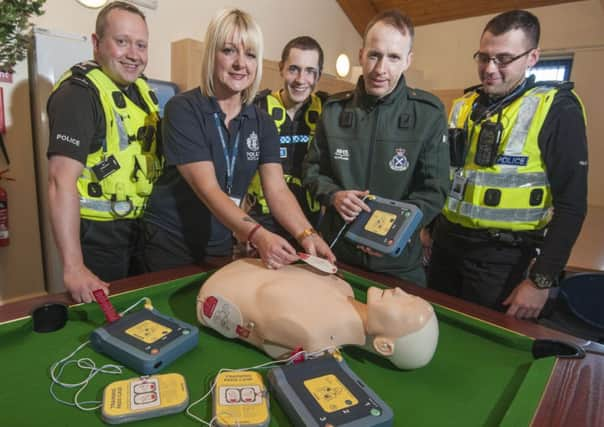Hands-on defibrillator training for police


Volunteers from Craigmillar Police Station signed up for the event on Tuesday in support of their colleague Karen Greechan, whose 13-year-old cousin Jamie Skinner suffered a fatal cardiac arrest while making his debut for Tynecastle FC in December 2013.
Karen – who has worked for the police for six years – helped set up the Jamie Skinner Foundation last year, which has campaigned tirelessly alongside the Evening News for better defibrillator provision.
Advertisement
Hide AdAdvertisement
Hide AdShe said: “We don’t want any other family to go through the same heartbreak we suffered when Jamie died. The event was about showing how easy a heart-start machine is to use. This is absolutely vital and it could mean the difference between life and death.”
Karen, 44, added: “It does make it hard to know how easy it could have been to save Jamie. Afterwards some officers came up and said they feel much more confident now. It is too late for Jamie but we can still help others.”
More than 1500 Scots died in the community last year after suffering a cardiac arrest, and a shock from a defibrillator within three to five minutes, administered alongside CPR, can increase chances of surviving a cardiac arrest by 75 per cent.
Sergeant Norman Towler, community sergeant at Craigmillar, said: “I can’t say enough how impressed we are by the Jamie Skinner Foundation’s work and how Karen has turned something so tragic into helping others.
Advertisement
Hide AdAdvertisement
Hide Ad“We get first aid training in our work but it doesn’t include having to use a defibrillator. Getting to see one in action shows how easy they are to use.”
Police Scotland does not have a policy of having the devices in stations currently – aside from custody centres – but he said officers could now feel more confident using the devices in public if required.
Staff from the Scottish Ambulance Service showed officers how to use the vital devices, and Paul Bassett, general manager of the South East Division at the ambulance service, said: “While we have world-class ambulance response times in Scotland, we know that in cardiac cases every second counts and that equipping communities with basic life-saving skills and equipment will further improve survival rates.”